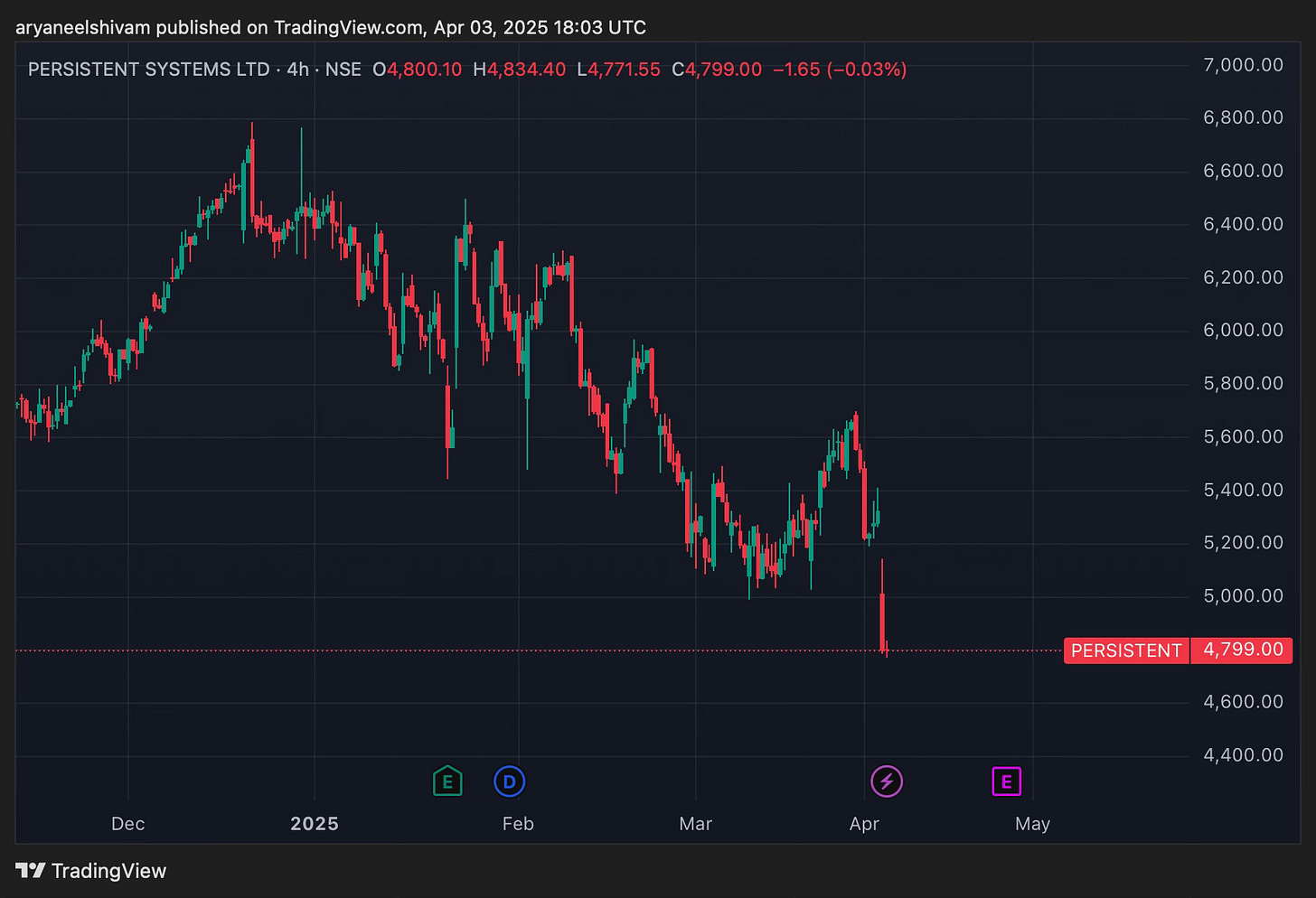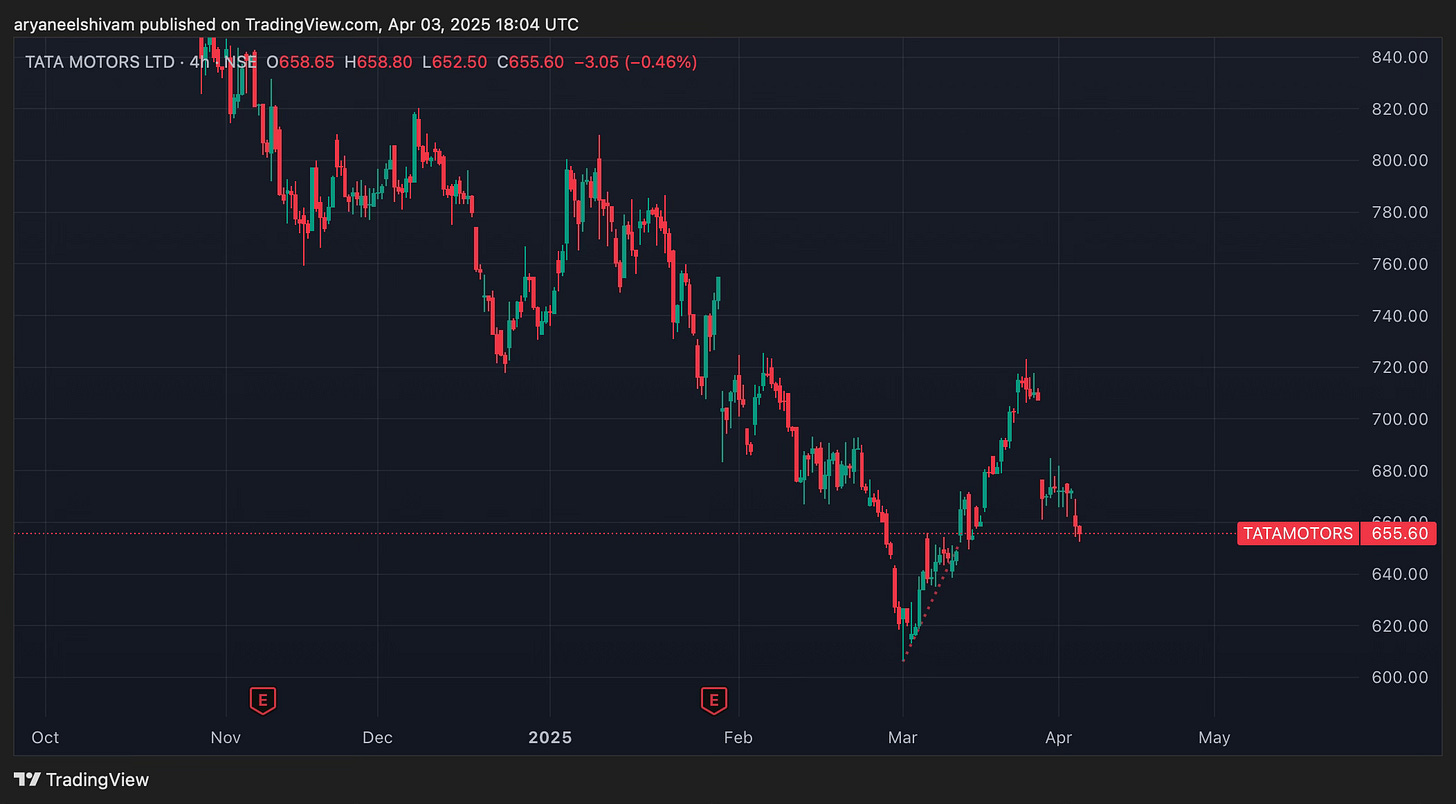Impact of Trump's 26% Tariff on Indian Exports: Sector-Wise Analysis of Stock Market Effects
The recent announcement by US President Donald Trump imposing a 26% reciprocal tariff on imports from India has sent ripples through the Indian stock market, creating both challenges and opportunities
The recent announcement by US President Donald Trump imposing a 26% reciprocal tariff on imports from India has sent ripples through the Indian stock market, creating both challenges and potential opportunities across different sectors. While the overall market showed resilience compared to other Asian indices, the impact varies significantly by industry, with some facing substantial headwinds while others have been explicitly exempted.
Immediate Market Reaction
The Indian stock market experienced an immediate negative reaction following Trump's announcement on April 2, 2025, which he dubbed "Liberation Day." The BSE Sensex declined by over 300 points to 76,262.06, while the Nifty 50 fell by 95.15 points to 23,237.20 in early trading on April 3rd[2]. This reaction, though significant, was relatively muted compared to other Asian markets, with Japan's Nikkei plunging 3.14% and Hong Kong's Hang Seng dropping 1.75%[2]. The Gift Nifty's 1.5% fall also indicated an immediate negative reaction[6].
Despite the initial shock, the Indian market demonstrated remarkable resilience. By mid-day, the Sensex had recovered somewhat, dipping only about 200 points[7]. Interestingly, market breadth remained positive, with small and micro-cap stocks managing to avoid the volatility that affected large-cap stocks and sector-specific indices[7]. This suggests that domestic investors view the tariffs as having a targeted rather than economy-wide impact.
Hardest-Hit Sectors
Electronics and Technology
The electronics sector faces one of the most significant impacts from the new tariffs. The US imports nearly $14 billion worth of electronics from India, making this industry particularly vulnerable[1]. Prior to this hike, Washington's tariffs on Indian electronic goods averaged just 0.41%, meaning the jump to 26% represents a massive increase that could severely affect competitiveness[1].
Gems and Jewelry
Another severely impacted sector is gems and jewelry, from which the US imports over $9 billion annually[1]. Previous tariffs on these products were only around 2.12%, making the new 26% rate a substantial barrier[1]. This sector's high exposure to the US market makes it especially vulnerable to the tariff shock.
Information Technology
The IT sector has been particularly hard hit in stock market trading. The Nifty IT index tumbled by over 4%, with some individual IT stocks plummeting as much as 9%[7]. Analysts have downgraded the sector to equal-weight due to increasing US recession risks[6]. While IT services aren't directly subject to import tariffs, the sector faces indirect pressure from potential US economic slowdown and reduced discretionary spending by American clients.
Automotive Industry
India's automotive sector, which contributes around 3% of the country's overall exports to the US, faces significant challenges[6]. Auto parts and aluminum exports are subject to a 25% tariff from previously announced measures, though they're outside the scope of the latest 26% levy[1]. Macquarie notes that the tariffs are "expected to impact demand and also the competitiveness of Indian automobile exports in the American market," potentially causing "higher production costs, layoffs and supply chain challenges"[6]. Stocks of automakers like Tata Motors and Samvardhana Motherson may see negative impacts[6].
Protected and Opportunity Sectors
Pharmaceuticals: The Big Winner
The pharmaceutical sector emerges as the clear winner in this tariff scenario. Despite Trump's sweeping tariffs, pharmaceuticals have been explicitly exempted[1][3][5][7]. This is a critical victory for Indian pharma companies, as the sector contributes around $12.2 billion to India's exports to the US, and India supplies over 40% of the US's generic drug requirements[5][7].
This exemption has been reflected in market performance, with the Nifty Pharma index surging 3% while most other sectors were declining[7]. Key pharmaceutical companies with substantial US revenue exposure include Aurobindo (48%), Zydus (47%), and Dr. Reddy's (46%)[3].
Energy Exports
Energy exports have also been spared from the new tariff structure[1]. This exemption, along with that for pharmaceuticals, protects nearly $9 billion in combined trade from the tariff impact[1].
Other Exempted Products
According to an executive order signed by Trump, several other categories have been exempted from the import tariffs, including copper, semiconductors, lumber, bullion (precious metals like gold and silver), and certain energy products and minerals not available in the US[1].
Economic Impact and Future Outlook
The overall economic impact of these tariffs on India is expected to be significant but manageable. Global brokerage HSBC estimates the tariffs could reduce India's GDP by 0.3-0.5%[3], while Macquarie suggests a 50 basis point hit on GDP[6]. However, experts point out that India's exports in the most vulnerable sectors amount to only 1.1% of India's GDP, suggesting the overall economic impact may be limited[6].
Some analysts see strategic opportunities amid the challenges. With higher tariffs imposed on competitors like Bangladesh (37%), Vietnam (46%), and Thailand (37%), India might gain competitive advantages in certain product categories like textiles and apparel[4]. The relatively lower 26% tariff on Indian goods (compared to China's 54%) may allow room for negotiation rather than retaliation[6].
Investment Implications
For investors, the tariff situation creates a clear divergence in sector performance. The market is signaling a "sell IT, buy pharma" sentiment, with pharmaceutical stocks rallying while IT stocks face pressure[7]. Sectors with direct export exposure to the US, particularly in electronics, gems and jewelry, and automotive components, may continue to face headwinds.
The tariffs may also have broader implications for monetary policy and inflation. Higher US tariffs could push inflation up by 1.5%, potentially derailing Federal Reserve rate cut expectations[7]. This could further influence global capital flows and currency markets, with additional pressure on the Indian rupee, which was hovering around 85.69 amid the market volatility[6].
Conclusion
Trump's 26% tariff on Indian exports represents a significant challenge for specific export-oriented sectors, particularly electronics, gems and jewelry, and IT services. The pharmaceutical industry stands out as a major beneficiary of exemptions, while other sectors face varying degrees of impact. While the overall economic effect on India may be moderate, individual companies with high US exposure will need to adapt through strategies such as market diversification, cost management, or diplomatic negotiations.
For investors, this development underscores the importance of sector selection and understanding global trade dynamics when constructing portfolios. As the situation evolves, further bilateral negotiations between India and the US may yet alter the landscape of these tariffs and their impact on the Indian economy and stock market.
Citations:
[1] https://www.business-standard.com/industry/news/donald-trump-india-tariff-exports-pharma-auto-it-aluminium-electronics-125040300300_1.html
[2] https://indianexpress.com/article/business/market/us-donald-trump-tariffs-india-stock-markets-sensex-nifty-50-9921556/
[3] https://www.businesstoday.in/markets/stocks/story/trump-tariffs-reciprocal-import-duty-will-affect-indian-stock-market-economy-470478-2025-04-03
[4] https://www.hindustantimes.com/india-news/how-will-trump-s-reciprocal-tariffs-affect-india-the-impact-on-vital-sectors-explained-101743682048391.html
[5] https://economictimes.com/markets/stocks/news/trump-tariff-hike-hits-dalal-street-4-sectors-facing-the-biggest-impact-global-brokerages-decode/articleshow/119928535.cms
[6] https://groww.in/blog/impact-of-trump-tariff-on-indian-imports
[7] https://economictimes.com/markets/stocks/news/sell-it-buy-pharma-what-trump-tariffs-mean-for-indian-stock-market-investors/articleshow/119935068.cms
[8] https://timesofindia.indiatimes.com/business/india-business/donald-trump-reciprocal-tariffs-why-indias-agricultural-exports-are-likely-to-be-little-affected/articleshow/119932504.cms
[9] https://www.indiatoday.in/business/story/india-26-percent-reciprocal-tariff-impact-decoded-sectors-at-risk-trade-deal-2703199-2025-04-03
[10] https://economictimes.com/markets/stocks/news/trumps-26-tariff-hits-india-here-are-sector-winners-and-losers/market-outlook/slideshow/119941045.cms
[11] https://www.moneycontrol.com/news/business/markets/trump-s-tariff-to-hurt-sectors-most-exposed-to-us-as-market-experts-assess-vulnerable-pockets-12983226.html
[12] https://economictimes.com/news/economy/foreign-trade/trumps-tariff-bombshell-hits-india-with-26-import-tax-but-some-desi-sectors-like-agriculture-farm-pharma-textile-electronics-steel-medicinesdodge-the-shrapnel-while-trump-odi-relation-remains-india-us-trade-ties-ariff-impact/articleshow/119929599.cms
[13] https://indianexpress.com/article/explained/explained-economics/explainspeaking-trump-reciprocal-tariffs-impact-india-9921436/
[14] https://www.bbc.com/news/articles/c367p03059yo
[15] https://www.financialexpress.com/market/bse-sensex-nifty-50-stock-market-today-live-updates-trump-tariffs-03-april-2025-3797009/
[16] https://economictimes.com/news/economy/foreign-trade/trumps-27-tariff-not-26-may-boost-indias-textile-semiconductor-sectors-over-asian-peers-gtri/articleshow/119929804.cms
[17] https://www.business-standard.com/markets/news/explained-how-will-donald-trump-s-reciprocal-tariffs-impact-india-125040300135_1.html
[18] https://www.financialexpress.com/policy/economy-explainer-is-there-a-silver-lining-in-the-reciprocal-tariffs-3797987/
[19] https://www.hindustantimes.com/india-news/markets-today-live-updates-nasdaq-updates-bse-nse-nifty-sensex-stock-market-crash-reciprocal-tariffs-trump-news-101743638828345.html
[20]
[21] https://timesofindia.indiatimes.com/world/us/donald-trump-tariff-announcement-live-updates-liberation-day-reciprocal-tariffs-india-global-us-stock-market-2-april/liveblog/119902879.cms
[22] https://www.ndtvprofit.com/business/us-trump-tariff-impact-itc-raymond-tata-motors-sona-blw-welspun-among-stocks-that-could-take-revenue-hit
[23] https://www.deccanherald.com/india/explained-how-will-trumps-reciprocal-tariffs-impact-indian-exports-3475408
[24]
[25] https://www.cnbctv18.com/economy/donald-trump-reciprocal-tariffs-liberation-day-us-market-impact-india-import-duties-19583403.htm
[26] https://www.financialexpress.com/market/trump-tariffs-worries-which-indian-stocks-could-feel-the-heat-3796468/
[27] https://timesofindia.indiatimes.com/business/india-business/donald-trump-tariffs-impact-on-india-explained-united-states-reciprocal-tariffs-sector-wise-analysis-trade-deal/articleshow/119917017.cms





